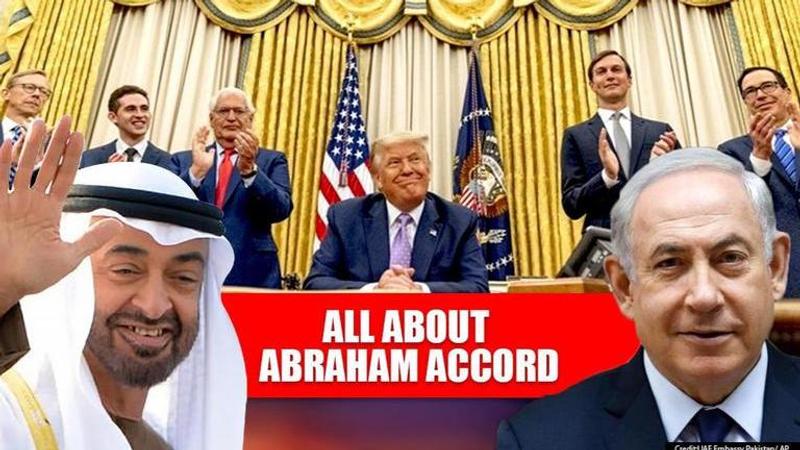Published 08:34 IST, September 2nd 2020
Israel, UAE to open embassies after diplomatic makeover: Here's all you need to know
Israel and UAE announced that it is establishing full diplomatic relations in a US-brokered deal called the Abraham Accord, here's all you need to know:

In what came as a major development in West Asia last month, Israel and United Arab Emirates (UAE) announced that it is establishing full diplomatic relations in a US-brokered deal called the Abraham Accord, with the first-ever flight between the two nations landing in Abu Dhabi on Monday. Both countries have also started discussions to open embassies in each other’s countries. According to the UAE, the deal was inked after Israel agreed to 'immediately stop' West Bank annexation plans, however, Israel says that it has 'suspended' the plans for the deal. With this, UAE became the third Arab country and the first Gulf nation after Egypt and Jordan to establish relations with Israel.
Here is the joint statement of Sheikh Mohamed bin Zayed, Crown Prince of Abu Dhabi and Deputy Supreme Commander of the Armed Forces, US President Donald Trump and Israeli Prime Minister Benjamin Netanyahu:
Relation of Israel with other Arab countries
The Jewish state of Israel was formed in 1948, and since then the country has fought almost six wars with its Arab neighbours. These wars predominantly stemmed from the conflict between Palestine and Israel. After World War II, demand for a homeland for Jews in the Arab dominated Palestine grew. Back then, Palestine was under the British mandate, but when it ended in 1947, the United Nations (UN) proposed an Arab-Jewish partition of Palestine. This partition plan mandated 53 percent of the land to the Jewish-majority state and 47 percent to the Palestinian-majority state. The Arab dominated West Asia did not accept a Jewish nation giving rise to conflict in the region. While Egypt and Jordan established diplomatic ties later, other Arab countries are of opinion that they would withhold recognition till the formation of Palestinian state in the West Bank and Gaza Strip.
What does it mean to Palestine?
President Mahmoud Abbas of the Palestinian Authority called the deal a 'betrayal' by the UAE. In a statement, Abbas' spokesman Nabil Abu Rudeineh said that it 'rejects and denounces' the UAE, Israeli and U.S. trilateral announcement and told its ambassador to the UAE to return immediately. The PA also urged the Arab League and the Organisation of Islamic Cooperation to assemble to reject the deal, calling it against the 'two-nation solution.' The statement said that neither the UAE nor any other party has the 'right to speak' in the name of the Palestinian people.
Hamas, a Palestinian militant group, that has control over the Gaza strip, has called the deal as 'stabbing in the back' of Palestinian people. Hamas which has fought three wars with Israel said that the announcement is a 'reward for the Israeli occupation’s crimes'.
What does it mean to US?
With this deal just ahead of the US presidential elections, Donald Trump has attempted to claim victory in his foreign policy approach, as he is heavily criticised for having isolated the US from important world groups, under the pretext of America First. Trump had tasked his son-in-law Jared Kushner for bringing 'peace in the middle east.' With the deal seen to be as a major 'breakthrough', Kushner and Ivanka Trump claim that 'history' is made.
Experts say the deal between UAE and Israel - brokered by the US - is a version of Trump's idea of 'Middle East peace'. Back in January, Trump had announced his 'Peace for Prosperity' that claimed to be 'a vision to improve the lives of the Palestinian and Israeli people'. However, Palestinians rejected it calling it a 'conspiracy deal” to which “we say a thousand times over: no, no, no”. Experts said it was heavily in favour of Israel and was without any meaningful Palestinian participation. Reports conclude that the UAE-Israel pact comes as a 'meek version' of Trump's middle east peace plan as he failed to gain impetus for his 'deal of the century'.
India's response
In a statement after normalization of ties between two countries, Indian foreign ministry spokesman Anurag Srivastava said that India 'has consistently supported peace, stability and development in West Asia which is its extended neighbourbood.' He pointed out that both nations are strategic partners of India. External Affairs Minister S Jaishankar also welcomed the normalisation of diplomatic relations after UAE foreign minister Sheikh Abdullah bin Zayed discussed the pact with him. He said it has opened up 'lots of opportunities' for the country as it has very good ties with the two countries. While Prime Minister Narendra Modi in 2015 made a major breakthrough by becoming the first Indian premier to visit UAE in 34 years, his camaraderie with Isreal Prime Minister Benjamin Netanyahu has grown in the past six years, with Modi visiting Isreal in 2017 and Netanyahu visiting India in 2018.
Updated 08:37 IST, September 2nd 2020





